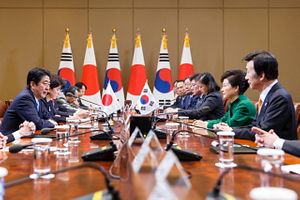On December 28, Japan and South Korea reached an agreement on how to address so-called “comfort women” issue. While the implementation of the agreement will be the key, this agreement is extremely important in preventing the issue from derailing the relationship between Tokyo and Seoul.
The agreement was announced in a form of parallel statements issued by Japanese Foreign Minister Fumio Kishida and Korean Foreign Minister Yun Byong-sei, after months of consultations between senior officials from both sides. There are several significant elements in this agreement, for which both Japanese and Korean officials deserve credit.
Most notably, the agreement provides a face-saving solution for South Korea while allowing Japan to remain consistent with its past position that all the issues related to Japan’s wartime wrongdoings were resolved with the signing of Japan-ROK Basic Treaty in 1965 and thus Tokyo is not obligated to compensate the individuals directly. Under the agreement reached on Monday, the Japanese government agreed to contribute funds to a foundation, to be established by the South Korean government, to assist the healing of the comfort women. These funds will be allocated from Japan’s national budget. In the 1990s, an attempt by the Murayama government to provide compensation for comfort women through the Asia Women’s Fund failed, largely because of criticism within South Korea that the Fund was not official and therefore could not be considered as “official” reparations. This agreement provides a clever formula by which Japan financially contributes government resources to a fund for comfort women without compromising its past position.
Secondly, Kishida’s statement includes Prime Minister Shinzo Abe’s “most sincere apologies and remorse” as Prime Minister of Japan. This is a direct response to some vocal critics who dismissed the 1993 Kono Statement and the 1995 Murayama Statement as expressions of those leaders’ personal feelings, and thus not official government apologies. Furthermore, the fact that it is Abe, the conservative prime minister, who expressed the official apology and remorse will help quiet so-called “revisionists” in Japan. While they are clearly upset with Abe reaching an agreement on this issue, they would not dare to attack Abe — “their” prime minister — for Monday’s agreement in the way they have attacked the Kono and Murayama statements.
Thirdly, the two countries agreed to take Monday’s foreign minister statements as confirmation that “this issue is resolved finally and irreversibly.” This was important particularly for Japan because of the growing resentment within Japan against Seoul for “moving the goal posts” on this issue no matter what Japan does or says. If Japan was going to be creative and lean forward on the issues of compensation and an official apology, it was critical that Tokyo have a guarantee that the agreement reached with the incumbent ROK government would “stick” with its successive administrations. After feeling betrayed once after issuing the Japan-ROK Joint Declaration in 1998 — then-ROK president Kim Dae-jung promised to his Japanese counterpart Prime Minister Keizo Obuchi that Kim’s successor would not resurrect the history issue with Japan again if Japan apologized, but the promise was not kept when Roh Moo-hyung succeeded Kim — Japan is no longer willing to go out of its way to reach an agreement with Seoul without a more explicit and official commitment that the validity of the agreement will outlive the incumbent administration.
The agreement on Monday, if upheld by the both governments, would remove the biggest obstacle that has prevented the two countries from engaging diplomatically and cooperating on their shared security concerns. In particular, as North Korea under Kim Jong-un behaves more erratically, unpredictably, and aggressively, the breakdown of the relationship between Tokyo and Seoul (and thus the inability to cooperate, even trilaterally with the United States) has become one of the biggest concerns for Washington in East Asia.
Of course, the implementation of the agreement will require sustained commitment from both governments. In Japan, Abe needs to make sure that some of his close advisors in and out of the government, who often have been loose cannons on historical issues, will not undermine the agreement by their provocative statements. In South Korea, the Park administration, already unpopular, will likely face strong criticism from NGOs that support the surviving comfort women and other political forces that do not want the government to make any compromise vis-à-vis Japan on the history issue. As the two governments proceed to fulfill their commitments, they cannot let these opposing forces to derail the bilateral relationship by undermining the agreement.
The agreement on Monday was definitely the first step toward long-overdue reconciliation between Japan and South Korea. Based on the strong reactions already coming out in both countries, this was also one of the most politically difficult foreign policy decisions made to date by Abe and Park. Although the jury is still out for the actual impact of the agreement, Abe, Park, and all those who worked to realize Mondays’ agreement deserve credit for what they have achieved.
































